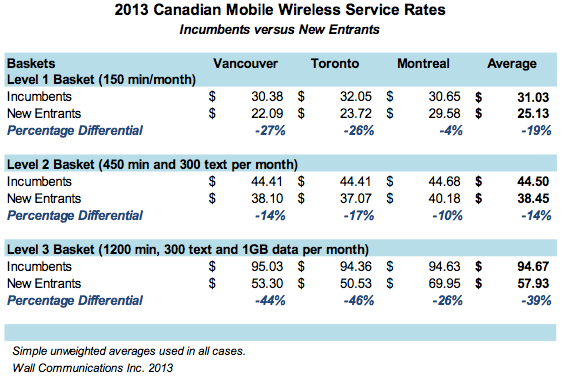
A report by Wall Communications on behalf of the CRTC and Industry Canada exploring pricing trends for wireless, mobile internet and broadband across Canada indicates a downward slope year over year.
Using data spanning five years, five provinces and six wireless carriers, the report compares not just intra-Canada pricing but those between six countries with established high-speed wireless networks: France, U.K., Australia, U.S., Japan and Canada.
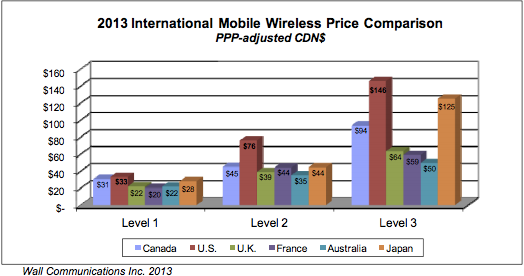
As always, the international comparison is divided into three tiers:
Level One offers 150 incoming & outgoing minutes per month, with 10% of outgoing minutes treated as long distance, and no optional features.
Level Two offers 450 incoming & outgoing minutes per month, with 10% of outgoing minutes treated as long distance, two optional features (voice mail and call display), and 300 text messages per month.
Level Three offers 1,200 incoming & outgoing minutes per month, with 15% of outgoing minutes treated as long distance, full set of optional features, 300 text messages and 1 Gigabyte (GB) data usage per month.
On average, Canada is more expensive than most of the other countries except for the United States and Japan, and when we’re lower it’s not by much. That being said, the average price of each tier has dropped slightly year over year; 11% for level one; 13% for level two; and 5% for level three.
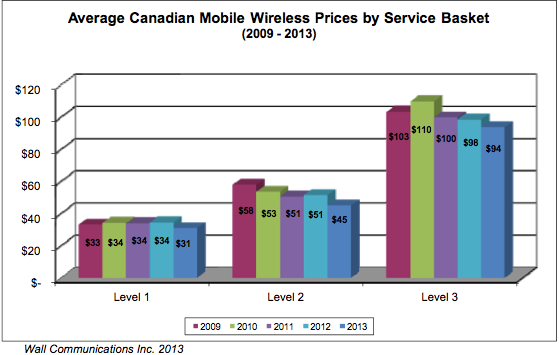
Lower prices for voice and text plans, which are largely bundled with each plan now, contributed to the lower costs across the board. Price of data, however, has stayed static in the last year, as you can see below.
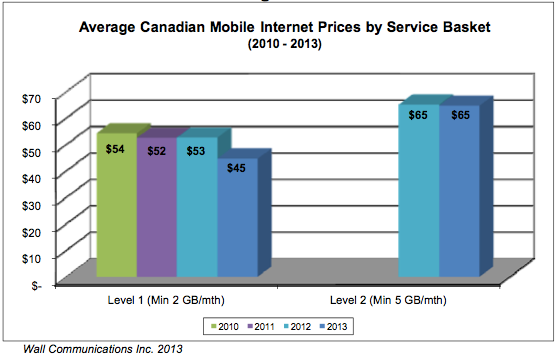
When buying a data package with no voice or texting abilities, it’s actually cheaper to purchase a 2GB bundle, but the 5GB bundle is still expensive at $65.
When comparing prices to other countries, Wall Communications does not include the average price of new entrant services, which are up 45% less than the incumbents in some cities. Because of WIND Mobile and Mobilicity’s larger data pool but slower prices, it’s not an apples-to-apples comparison, but showing the prices side by side certainly provides context. Of course, the new entrants lack the same service reliability, speed or customer support, and with the tentative financial health of both WIND and Mobilicity, things will likely look very different a year from now.
Wall Communications concludes its wireless portion of the report by saying, “In sum, the Canadian Level 2 (average usage) mobile wireless service basket price falls in the middle of the group relative to the five foreign justifications included in this study. However, in the case of the Level 1 (low usage) and Level 3 (high usage including data) service baskets, Canada tends to fall on the high side of the average for the group of surveyed countries.”
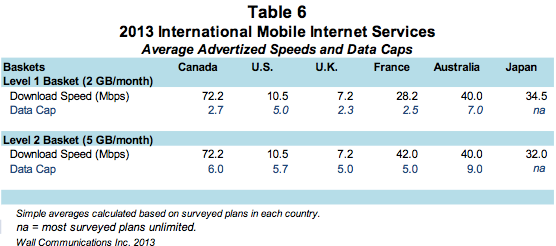
With the implementation of the Wireless Code of Conduct in December, which will essentially limit wireless contracts to 24 months, it will be interesting to see how wireless providers respond. An increase in monthly prices, at least in the short term, is the most likely scenario, as Canadians are largely unwilling to sacrifice their considerable device subsidies. It’s also worth noting that Canada’s LTE networks, compared to the other countries in the study, are at the high-end in terms of advertised speed, though actual speed tests were not performed in each location.
There is cause for both consternation and celebration from this study. Canada’s wireless networks are maturing and expanding quickly, bringing LTE-class speeds to more customers across the country. Prices are high — not the highest, though — and so are speeds.
You can read the whole report in PDF format over at Wall Communications.
MobileSyrup may earn a commission from purchases made via our links, which helps fund the journalism we provide free on our website. These links do not influence our editorial content. Support us here.

